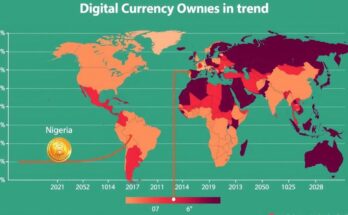South Africa’s President Cyril Ramaphosa has called for collaboration with Nigeria to utilize lithium for the expansion of electric vehicle batteries. During the Nigeria-South Africa Business Roundtable, he highlighted the potential for joint efforts in various sectors, including clean energy and pharmaceuticals, while pledging support for Nigeria’s entry into the G20. The nations have also activated a council aimed at enhancing trade relations. President Bola Tinubu emphasized Nigeria’s openness for business and commitment to fostering a stable environment for investment.
President Cyril Ramaphosa of South Africa has affirmed his country’s commitment to partnering with Nigeria in the exploration and utilization of critical minerals, with a particular focus on lithium, essential for advancing electric vehicle (EV) battery production. During the Nigeria-South Africa Business Roundtable in Cape Town, the President emphasized the importance of Nigeria’s lithium resources as foundational for industrial growth in the EV sector. He called upon private enterprises and development finance institutions to collaborate in enhancing infrastructure and manufacturing capabilities within this burgeoning market.
Ramaphosa articulated the potential for mutual benefit in various sectors, including pharmaceuticals, highlighting the strategic positioning of both nations in capitalizing on the growth of clean energy industries. He shared South Africa’s initiatives, such as the Just Transition Framework and Investment Plan, which aim at attracting substantial investments in renewable energy and the green economy. Furthermore, he advocated for the beneficiation of critical minerals at their source to stimulate green industrialization.
Additionally, President Ramaphosa extended South Africa’s support for Nigeria’s bid to join the G20, reiterating the need for African representation in this influential group. He underscored South Africa’s previous solitary contribution as Africa’s voice in the G20 and the importance of expanding Africa’s presence within the global economic dialogue. The support for Nigeria in this endeavor underscores the growing importance of regional collaboration.
Both nations have activated the Joint Ministerial Advisory Council on Industry, Trade, and Investment, aimed at bolstering economic relations. The Council’s operationalization is intended to create favorable conditions for trade and investment, addressing current challenges. President Ramaphosa noted the significant trade deficit his country faces with Nigeria, largely due to oil and gas imports, highlighting the necessity to diversify trade engagements.
President Bola Tinubu of Nigeria assured that the nation stands ready to foster an enabling environment for business, emphasizing stability, security, and adherence to the rule of law as key priorities. At the roundtable, he also addressed the necessity for mutual support and cooperation between the two nations to facilitate the growth of companies operating in both contexts, echoing a shared commitment to prosperity across the continent.
In conclusion, the cooperative efforts between South Africa and Nigeria in harnessing lithium and enhancing trade relations signal a strategic commitment to fostering sustainable economic growth. With continued dialogue, infrastructure development, and collaborative investment efforts, both nations aim to significantly contribute to the green energy transition and bolster their positions in the global economic landscape.
The collaboration between South Africa and Nigeria arises from a mutual recognition of the importance of lithium as a critical mineral necessary for the production of electric vehicle batteries. The global shift towards renewable energy and electric vehicles has underscored the significance of such resources. Both countries are strategically positioned within the African continent to exploit these minerals, which not only serve industrial purposes but are also pivotal in promoting green industrialization and sustainable economic development. The establishment of the Joint Ministerial Advisory Council aims to streamline economic relations and address trade challenges, reflecting a deeper engagement in fostering regional cooperation and expanding opportunities in various sectors.
In summary, the partnership between South Africa and Nigeria represents a vital step towards leveraging both nations’ natural resources and capabilities, particularly in the lithium sector, as they transition to a green economy. The emphasis on mutual cooperation, investment in infrastructure, and the activation of trade councils is a strategic move to enhance economic ties, diversify trade beyond traditional sectors, and support each other’s aspirations for growth on the international stage. Their collective efforts not only promise mutual benefits but also position them as key players in the global shift towards sustainable energy solutions.
Original Source: www.arise.tv




